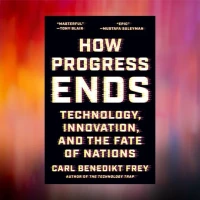In How Progress Ends, Carl Benedikt Frey challenges the conventional belief that economic and technological progress is inevitable. For most of human history, stagnation was the norm, and even today progress and prosperity in the world’s largest, most advanced economies—the United States and China—have fallen short of expectations. To appreciate why we cannot depend on any AI-fueled great leap forward, Frey offers a remarkable and fascinating journey across the globe, spanning the past 1,000 years, to explain why some societies flourish and others fail in the wake of rapid technological change.
By examining key historical moments, from the rise of the steam engine to the dawn of AI, Frey shows why technological shifts have shaped, and sometimes destabilized, entire civilizations. He explores why some leading technological powers of the past, such as Song China, the Dutch Republic, and Victorian Britain, ultimately lost their innovative edge, why some modern nations such as Japan had periods of rapid growth followed by stagnation, and why planned economies like the Soviet Union collapsed after brief surges of progress. Frey uncovers a recurring tension in history: while decentralization fosters the exploration of new technologies, bureaucracy is crucial for scaling them. When institutions fail to adapt to technological change, stagnation inevitably follows. Only by carefully balancing decentralization and bureaucracy can nations innovate and grow over the long term—findings that have worrying implications for the United States, Europe, China, and other economies today.
Through a rich narrative that weaves together history, economics, and technology, How Progress Ends reveals that managing the future requires us to draw the right lessons from the past.
About the speaker
Carl-Benedikt Frey is the Dieter Schwartz Associate Professor of AI & Work at the Oxford Internet Institute and a Fellow of Mansfield College, University of Oxford. He is also Director of the Future of Work Programme, Senior Research Fellow at INET Oxford and Oxford Martin Citi Fellow at the Oxford Martin School.
After studying economics, history, and management at Lund University, Frey completed his PhD at the Max Planck Institute for Innovation and Competition in 2011. He subsequently joined the Oxford Martin School where he founded the programme on the Future of Work. Between 2012 and 2014, he was teaching at the Department of Economic History at Lund University.
In 2012, Frey became an Economics Associate of Nuffield College and Senior Fellow at the Institute for New Economic Thinking, both University of Oxford. He remains an Associate Fellow of the Department of Economic History at Lund University, and a Fellow of the Royal Society of Arts. In 2019, he joined the World Economic Forum’s Global Future Council on the New Economic Agenda, as well as the Bretton Woods Committee. And between 2020 and 2022, he was a member of the Global Partnership on Artificial Intelligence (GPAI) – a multistakeholder initiative to guide the responsible development and use of AI, hosted by the OECD.
In 2013, Frey co-authored The Future of Employment: How Susceptible Are Jobs to Computerization. With over 12,000 citations, the study’s methodology has been used by President Barack Obama’s Council of Economic Advisors, the Bank of England, the World Bank, as well as the popular automation risk-prediction tool of the BBC. In 2019, the paper also featured on the Last Week Tonight Show with John Oliver.
Frey has served as an advisor and consultant to international organisations, think tanks, government, and business, including the G20, the OECD, the European Commission, the United Nations, and several Fortune 500 companies. He is also an op-ed contributor to the Financial Times, Foreign Affairs, Scientific American, and the Wall Street Journal, where he has written on the economics of artificial intelligence, the history of technology, the future of cities, and remote work.
His academic work has featured in over 100 media outlets, including The Economist, New York Times, Time Magazine, The New Yorker, Le Monde, and Frankfurter Allgemeine Zeitung. In addition, he has frequently appeared international broadcast media such as CNN, BBC, PBS News Hour, Al Jazeera, and Sky News.
His most recent book, The Technology Trap: Capital, Labor, and Power in the Age of Automation, was selected a Financial Times Best Books of the Year in 2019, when it also won Princeton University’s prestigious Richard A. Lester Prize.
